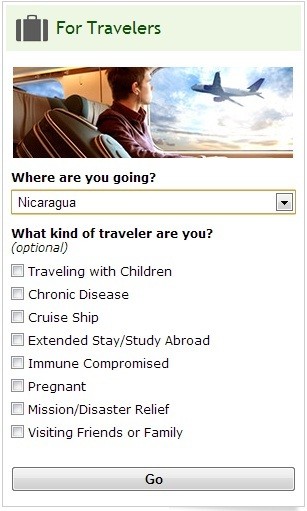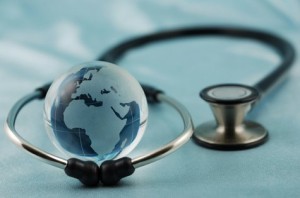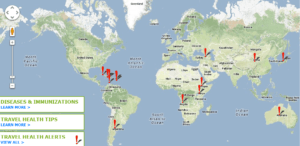This post may contain affiliate links. As an Amazon Associate I earn from qualifying purchases.
* * *
For most of my travels, my health preparations are nothing more than absent-mindedly throwing a first aid kit into my suitcase. I take standard precautions to keep myself healthy, such as washing my hands, avoiding insect bites, and being careful about what water I drink. Basic care is adequate for travel throughout most of the developed world. Just to cover my bases, though, I thought it would be prudent to read up on health considerations for my upcoming trip to Nicaragua.
For all things related to travel health, your first stop should be at the CDC Traveler’s Health website. The CDC offers a ton of information for travelers headed to anywhere in the world, including which vaccinations are recommended, what other health risks you should be aware of, and general good practices to stay healthy during (and after) your trip.

Be prepared for information overload. In fact, I’d make sure you’ve carved out at least thirty minutes to read about vaccinations and health risks before your trip. While the immunization summary is compact, most of their other articles aren’t. That means there’s lots of good information available but you have to dig a little to understand it all. If you’re looking for a quicker hit, I like the Travelers Vaccines website. You’ll see red exclamation points in areas with current health alerts and straight-to-the-point information on immunizations by country. It can be a good starting point until you have time to read more thoroughly at the CDC Traveler’s Health website.
Don’t ignore the basics. It’s far too easy for you to spend all your time focusing on issues related specifically to your travel destination. Although I think this is an important thing to prepare for, don’t do it at the expense of forgetting about your general health. Routine vaccinations (and standard healthcare) can be just as important. My husband had a bad case of the flu in Morocco and will admit that he was just as miserable as if he had come down with a less common illness.

There’s more to travel health than immunizations. Unfortunately, not every disease can be prevented by getting a jab ahead of time. In Central America (and other tropical regions), malaria and dengue fever should be taken seriously (hint: this UK website offers easy-to-read malaria risk maps). In much of the world, foodborne illness can cause a lot of distress or cause more serious dehydration in severe cases. Even cruises can be hotbeds for spreading diseases such as norovirus and unfortunately you can find bed bugs in every country of the world if you’re not careful, so don’t fall into the trap of thinking that staying healthy is a no-brainer.

Listen to your body. I will be the first to admit that I push myself physically on vacation. I strain my body with physical exertion (my first bike ride in years was 34 miles long), spend less time sleeping so I have more time for exploring, and eat foods that I’d never eat at home. More often than not, my body can handle it and may even feel more energized from so many new experiences. However, when you’re simultaneously pushing your body and exposing it to new germs and environments, you might end up catching a bug. If you start to feel ill, give your body the rest and nutrients it needs so it can recover instead of continuing to push yourself.
So far, I’ve done well with simply taking care of myself and avoiding hazardous situations. Being aware of health risks is a good way to supplement your normal healthy behaviors and take additional precautions as necessary. Yes, I’m healthy now — but I’d like to stay that way!
I’ll be continuing my travel health series to share my experience at a local travel clinic and what to pack in a first aid kit so stay tuned for more articles!
How seriously do you take your health while traveling? Do you take extra measures to protect yourself?


We 1) are vaccinated, 2) check for bedbugs, 3) are aware of our surroundings.